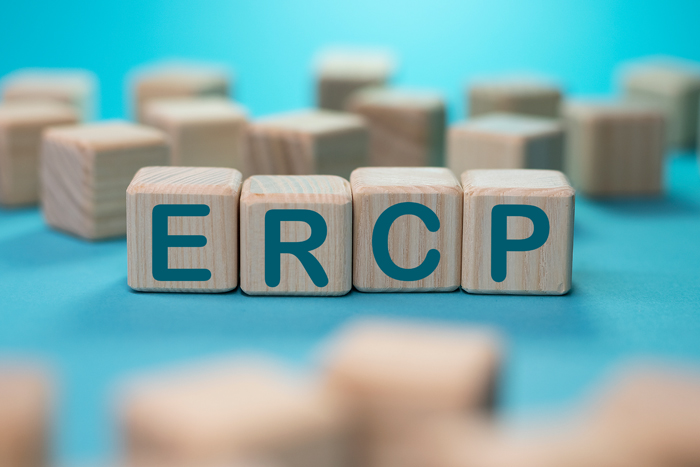ERCP Treatment & Diagnostics in Karol Bagh, Delhi
ERCP
Endoscopic retrograde cholangiopancreatography or ERCP is a technique for diagnosis and treatment of gallbladder, bile duct, liver and pancreatic disorders. It uses X-rays in combination with a long, flexible light tube. The scope is guided into your mouth and throat, then into the stomach, esophagus and first portion of the small intestine by your healthcare professional.
Your health professional can see and check for abnormalities inside these organs. He/she will then inject a dye via a tube that has passed through the scope. An X-ray highlights the organs.
If you are searching for an ERCP procedure, a gastroenterologist in New Delhi can help you with the right treatment.
What is ERCP?
An ERCP is a technique done in an X-ray room using X-ray films. The endoscope is entered gently into the upper esophagus. A small tube is placed in the main bile duct as it enters the duodenum using an endoscope.
Dye is subsequently injected into this bile duct, and images taken from the pancreas. If gallstones are found, they may be removed. If the duct appears blocked, electrocautery (electric heat) could be used to remove the obstruction. Additionally, tiny tubes are inserted into constricted ducts to keep them open. The examination takes 20 to 40 minutes, and the patient will be taken to the recovery area.

Who qualifies for the procedure?
You may require ERCP to determine the reason for unexplained stomach discomfort or skin and eye yellowing (jaundice). This may be recommended for patients who are suspected to be suffering from pancreatitis or liver, pancreatic or bile duct cancer.
ERCP may also reveal the following:
- Bile duct obstructions or stones
- Bile or pancreatic duct fluid leaking
- Pancreatic duct obstruction or narrowing
- Tumors
- Bacterial infection of the bile ducts
Request an appointment at Apollo Spectra Hospitals, Karol Bagh, New Delhi.
Call 1860 500 2244 to book an appointment.
Why is the procedure conducted?
Doctors use ERCP to identify and treat pancreatic and bile duct disorders. You may, for example, get ERCP if your doctor detects a pancreatic or liver illness or a bile duct problem. You may also have ERCP to determine the reason for an abnormal blood test, an ultrasound or a CT scan or solve an issue indicated by one of these tests. Finally, ERCP can help your doctor in deciding whether you need surgery and, if so, which is the best procedure.
The main reasons for doing ERCP are:
- Yellow skin or eyes, light stool and dark urine
- Bile or pancreatic duct
A pancreatic, gallbladder or liver lesion or tumor
Your doctor may conduct ERCP in some conditions before or after gallbladder surgery. ERCP can also assist in finding cancer or non-cancer lesions. If your bile duct has obstruction, your doctor may use ERCP to place a tiny plastic tube known as a stent. The duct remains open, and digestive juices flow. Finally, after gallbladder surgery, ERCP can help in identifying and treating problems.
What are the benefits?
- Clears the bile ducts of blockage
- Can diagnose and cure gallbladder surgery problems
- Helps treat chronic pancreatitis by acting as a therapeutic agent
- Recognizes bile and pancreatic duct abnormalities
- Used to find stones in the pancreatic and bile ducts
What are the complications?
If you have any of these usual issues after ERCP, contact the best gastroenterologist in Delhi:
- Severe belly ache
- Chills
- Nausea
- Blood in stool
ERCP is not a permanent procedure, since the doctor removes the tube from the stomach after examination of both bile and pancreas.
Patients will be sedated with anesthetics during ERCP, and hence, they will not suffer pain. However, they may feel minor pain or discomfort after the procedure.
- Persons using medicines such as blood thinners and NSAIDs
- People allergic to contrast dyes
- Individuals who had intestinal surgery
ERCP's success rate relies on the following factors:
- Age of the patient
- The disease's severity
- The area to investigate
- Doctor's experience
- Certain medicines should be avoided, including blood thinners such as warfarin and heparin, as well as nonsteroidal anti-inflammatory drugs (NSAIDs) like aspirin, ibuprofen, and diclofenac.
- Discuss the risks, complications and benefits of ERCP with your physician.
- A patient should talk to his/her doctor about any drug allergies or contrast color or iodine allergies
Our Top Specialities
NOTICE BOARD
CONTACT US
CONTACT US
 Book Appointment
Book Appointment


.svg)
.svg)
.svg)
.svg)








